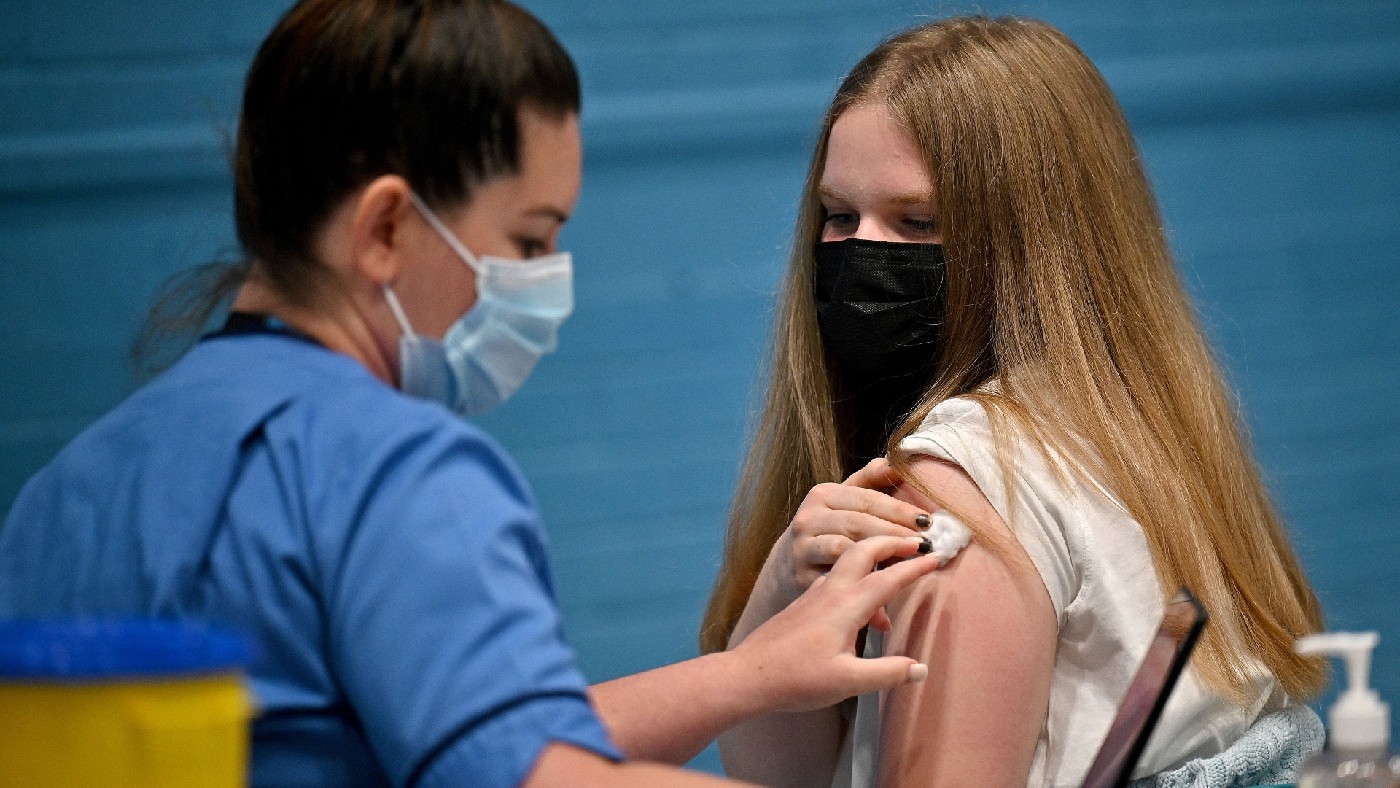Pros and cons of vaccinating teenagers: the dilemma facing parents
A recent survey found almost half were either unsure about letting their children be jabbed or firmly against

A free daily email with the biggest news stories of the day – and the best features from TheWeek.com
You are now subscribed
Your newsletter sign-up was successful
“Any parent can be forgiven for feeling perplexed, if not alarmed,” said Paul McKay in the Daily Mail. Three weeks ago, the government publicly ruled out the vaccination of healthy children. Yet now the NHS is pushing “full steam ahead” with plans to offer all 16- and 17-year-olds a dose of the Pfizer jab.
But rest assured: there’s nothing sinister in this. The Joint Committee on Vaccination and Immunisation (JCVI) has just re-assessed its position in light of recent findings. Scientists are now confident the jab is safe for teenagers. And though it’s clear that the 1.4 million teens eligible for the jab are in very little danger of developing serious symptoms of Covid-19 themselves, they can still infect the vulnerable and unvaccinated.
The Delta variant is highly infectious and no one wants to see another surge in cases when schools return in the autumn. In short, the benefits far outweigh the costs. The latest guidance simply brings us into line with most other European countries… and rightly so.
The Week
Escape your echo chamber. Get the facts behind the news, plus analysis from multiple perspectives.

Sign up for The Week's Free Newsletters
From our morning news briefing to a weekly Good News Newsletter, get the best of The Week delivered directly to your inbox.
From our morning news briefing to a weekly Good News Newsletter, get the best of The Week delivered directly to your inbox.
The JCVI’s change of heart is welcome, but I’d go further still and offer the jab to all those over 12, said Deepti Gurdasani in The Guardian. That’s what they’re already doing in Canada, France and the US. This wouldn’t just check the spread of the disease: it would be for the children’s benefit, too.
Even for the young, Covid-19 isn’t just another “minor illness”. According to the Office for National Statistics, some 34,000 children under 18 are suffering from long Covid, more than 7,000 of whom have been living with it for more than a year. We also know the disease can have “long-term neurological effects” for hospitalised children, some quite possibly permanent.
But parents remain suspicious, said David Cox in The Daily Telegraph. A recent survey found almost half were either unsure about letting their children be jabbed or firmly against. Not without reason: studies in the US have linked the Pfizer jab to cases of myocarditis or heart inflammation in the young. But in the end that shouldn’t deter us: we’re only talking of a handful of cases and most have been swiftly treated.
That small risk might nevertheless outweigh the even smaller risk of a child getting seriously ill with Covid, said The Sunday Telegraph. Which is why vaccinating children is no straightforward issue. Is it for their benefit or is it to protect older age groups? And if it becomes a precondition for international travel, won’t the decision to jab them become more for social than health reasons?
A free daily email with the biggest news stories of the day – and the best features from TheWeek.com
My reservations have more to do with priorities, said Alex Richter on The Conversation. How can we justify giving scarce vaccines to our teenagers, who are most unlikely to become seriously ill from the disease, when millions of vulnerable people around the world are still waiting for a first dose?
It’s not only unjust, it’s short-sighted. Viruses don’t need passports. If other nations can’t control the disease they’ll send it right back to us. The WHO has advised richer nations to hold off giving booster jabs until vaccines are more fairly shared. The same should surely apply to jabs for the young.
-
 ‘Those rights don’t exist to protect criminals’
‘Those rights don’t exist to protect criminals’Instant Opinion Opinion, comment and editorials of the day
-
 Key Bangladesh election returns old guard to power
Key Bangladesh election returns old guard to powerSpeed Read The Bangladesh Nationalist Party claimed a decisive victory
-
 Judge blocks Hegseth from punishing Kelly over video
Judge blocks Hegseth from punishing Kelly over videoSpeed Read Defense Secretary Pete Hegseth pushed for the senator to be demoted over a video in which he reminds military officials they should refuse illegal orders
-
 Growing a brain in the lab
Growing a brain in the labFeature It's a tiny version of a developing human cerebral cortex
-
 A Nipah virus outbreak in India has brought back Covid-era surveillance
A Nipah virus outbreak in India has brought back Covid-era surveillanceUnder the radar The disease can spread through animals and humans
-
 Trump HHS slashes advised child vaccinations
Trump HHS slashes advised child vaccinationsSpeed Read In a widely condemned move, the CDC will now recommend that children get vaccinated against 11 communicable diseases, not 17
-
 A fentanyl vaccine may be on the horizon
A fentanyl vaccine may be on the horizonUnder the radar Taking a serious jab at the opioid epidemic
-
 Health: Will Kennedy dismantle U.S. immunization policy?
Health: Will Kennedy dismantle U.S. immunization policy?Feature ‘America’s vaccine playbook is being rewritten by people who don’t believe in them’
-
 How dangerous is the ‘K’ strain super-flu?
How dangerous is the ‘K’ strain super-flu?The Explainer Surge in cases of new variant H3N2 flu in UK and around the world
-
 Vaccine critic quietly named CDC’s No. 2 official
Vaccine critic quietly named CDC’s No. 2 officialSpeed Read Dr. Ralph Abraham joins another prominent vaccine critic, HHS Secretary Robert F. Kennedy Jr.
-
 This flu season could be worse than usual
This flu season could be worse than usualIn the spotlight A new subvariant is infecting several countries